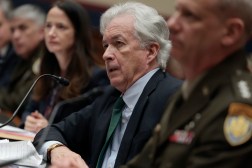 The CIA held its first public conference on national security June 11 at Georgetown University in Washington, D.C. (l-r, Paul Pillar, Georgetown faculty member; John Gannon, former deputy director for Intelligence at the CIA; Letitia Long, director of the National Geospatial-Intelligence Agency; Gilman Louie, founder of In-Q-Tel; and Juan Zarate, former deputy national security adviser at the White House).
The CIA held its first public conference on national security June 11 at Georgetown University in Washington, D.C. (l-r, Paul Pillar, Georgetown faculty member; John Gannon, former deputy director for Intelligence at the CIA; Letitia Long, director of the National Geospatial-Intelligence Agency; Gilman Louie, founder of In-Q-Tel; and Juan Zarate, former deputy national security adviser at the White House).Current and former U.S. intelligence officials acknowledged Wednesday that the private sector’s distrust of the government in the wake of the National Security Agency leaks has become a major national security crisis orchestrated in large part by foreign governments trying to advance their own Internet economies.
The concern stems from an increasingly confrontational stance taken by several large U.S. Internet companies on the government’s handling of proposed changes to the Foreign Intelligence Surveillance Act, which governs NSA’s telephone metadata collection program and other electronic surveillance programs.
These companies — including the likes of Facebook, Google, Microsoft and Apple, among others — have not only publicly opposed recent FISA reform legislation because it didn’t go far enough, but in some cases, they have begun to actively work to foil U.S. intelligence collection as a means to reassure customers that they value privacy.
“We should be really mad at Google and Facebook and Microsoft because they’re doing a very interesting and, I think, a very dangerous thing,” said Rep. Mike Rogers, R-Mich., chairman of the House Permanent Select Committee on Intelligence, speaking June 11 at the CIA’s first-ever public conference on national security.
“They’ve decided to come out and say ‘we oppose this new FISA bill because it doesn’t go far enough.’ When you peel that onion back a little bit … they say ‘well, we have to do this, because we’re trying to make sure we don’t lose our European business,’ That offends me,” Rogers said.
Rogers was referring to a recent open letter signed by the CEOs of Facebook, Google and Microsoft, as well as those of AOL, Apple, Dropbox, LinkedIn, Twitter and Yahoo, opposing the FISA reform legislation that passed the House May 22. They, along with civil liberties groups, argued the bill would not end NSA’s bulk collection of telephone records.
“Think about what they’re doing,” Rogers said. “They’re willing to, in their minds, justify the importance of their next quarter’s earnings in Europe versus the national security of the United States. If we don’t get this part turned around very quickly, it will likely get a little ugly.”
A Facebook spokesperson said in an email, “From day one we’ve said there must be civil liberty protections and increased transparency while keeping America safe. We continue to believe it’s the only way to create the safe and free society we all want over the long-term.”
FedScoop reached out to the other companies mentioned during the conference, but did not receive responses by press time.
The more significant concern expressed by Rogers and other officials taking part in the CIA conference stems from what many characterized as a concerted effort by European governments to use the NSA scandal as leverage when dealing with U.S. Internet and cloud providers.
“We have a situation where other nation states, whether by design or by practice, have turned a particular valuable asset of our commercial enterprise away from the U.S. [government] and towards other nation states,” said Gilman Louie, former CEO of the CIA’s high-tech venture capital fund known as In-Q-Tel. “And that has huge implications and huge risks.”
“Other countries are very active right now going out there and saying you can’t trust American products, buy our products,” Louie said. “The Europeans are using their judicial system in the context of protecting their citizens as a way to reach what U.S. companies can produce and put on the net.”
Rogers agreed, adding that during his recent trips to Europe, political leaders there were fond of equating the CIA to the notorious former East German internal security service known as the Stasi.
“This is about protecting their products,” Rogers said of the European Union’s “feigned” outrage over U.S. surveillance activities. “They’re going after Google and Amazon and going after those other companies saying, ‘you can’t trust [the U.S.] but you can trust us,’ It is an absolute farce.”
 Former CIA Deputy Director for Intelligence John Gannon said the trust gap between the government and the private sector “is a very serious crisis.”
Former CIA Deputy Director for Intelligence John Gannon said the trust gap between the government and the private sector “is a very serious crisis.”“I think there is a very serious crisis” in the relationship between U.S. Internet and telecommunications companies and the intelligence community, said John Gannon, the former deputy director for intelligence at CIA. “And I think clearly the goal should be to fix the relationship.”
But while the relationship between the private sector and the government must be productive, Gannon said, it is one that must be based on trust and confidence on both sides.
“The private sector is too important …and it has information that is very important to the government’s mission to protect the American people,” Gannon said.
“This is a crisis,” said Letitia Long, director of the National Geospatial-Intelligence Agency. “We need our industry partners in order to do what we do.”
But for now, the private sector feels like they are “on their heels” and under siege from the wave of misleading news reports and other misconceptions that paint them as collaborators in a global dragnet orchestrated by an evil government, said Juan Zarate, former deputy national security adviser to President George W. Bush.
“We also need to take the moral high ground again,” and explain how what the U.S. intelligence community does is fundamentally different than what authoritarian regimes like China and Russia do with their industries, Zarate said.
“I’ll have that debate any day. Would you rather have a Cisco or a Huawei working with you? Would you rather work with Google or Alibaba?” asked Zarate, referring to two Chinese-owned companies suspected of working with Chinese intelligence to conduct economic espionage.
“I think if we have an open debate about what other governments do in this space, that debate begins to shift in a fairly fundamental way,” Zarate said. “And that plays right into our hands and the favor of American companies.”
“One of the biggest lessons of the last year has been the need for public discussion and transparency into the intelligence process so that the community can achieve the consent of the governed,” said Chris Inglis, former deputy director of NSA.
“Big data is much maligned. Sometimes it’s a boon and sometimes it’s a bane,” Inglis said. But “one of the shames of the [Edward] Snowden leaks has been it’s chilled collaboration.” Follow @DanielVerton




